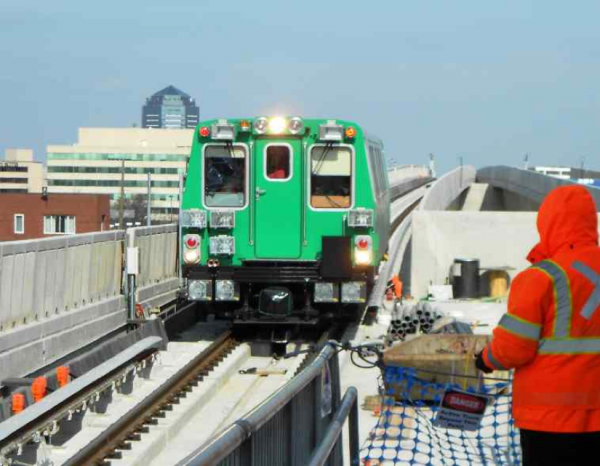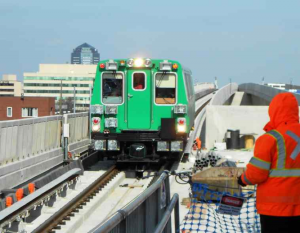 The Metropolitan Washington Airports Authority’s (MWAA) Board of Directors this week finalized the bond sale that will complete the financing of the Silver Line.
The Metropolitan Washington Airports Authority’s (MWAA) Board of Directors this week finalized the bond sale that will complete the financing of the Silver Line.
The $422 million in Dulles Toll Revenue bonds, which were priced on May 14, will close on May 22, MWAA’s Board of Directors announced at its monthly meeting on Wednesday.
From MWAA:
High investor interest helped drive down interest rates for the bonds, which were rated Baa1 by Moody’s and Baa1 by Standard & Poor’s. Drivers on the Dulles Toll Road will ultimately benefit from the low interest rates achieved on these bonds.
With the completion of the bond sale and the May 1 announcement of federal approval of the application for a low-interest loan through the Transportation Infrastructure Finance and Innovation Act (TIFIA) program, major financing for the Airports Authority’s portion of the Silver Line project will soon be complete.
“Our pledge from the beginning of our stewardship of the Silver Line and the Dulles Toll Road has been to limit the impact on drivers,” said Airports Authority Chairman Frank M. Conner III.
“This final bond sale in a low interest-rate environment, as well as other efforts such as the recently approved low-interest federal loan and the $300 million committed by the Commonwealth of Virginia for the project, allow us to fulfill that pledge. And we will continue working to find cost savings that can be passed along to Toll Road users.”
The board has said that when the financing is in place, toll road users can count on toll rates to remain frozen until 2018. Some had predicted that rates would rise as high as $18 in the next several years without additional sources of financing. Read More
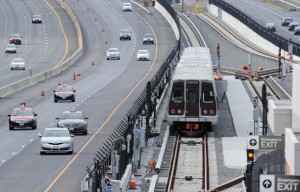 The Silver Line will be considered at operational readiness by May 27, Metro General Manager Richard Sarles said on Monday.
The Silver Line will be considered at operational readiness by May 27, Metro General Manager Richard Sarles said on Monday.
That date — which may change by a few days on either end — will mean Metro has taken control of the project from the Metropolitan Washington Airports Authority. It will also mark the beginning of a 90-day testing and training window for Metro, meaning the rail extension from East Falls Church to Reston’s Wiehle Avenue is expected to open by the end of August.
However, Sarles would not speculate on an exact opening date — or even an exact opening month.
“We will be good to go when all the work is done,” he said on Metro’s weekly call with reporters. “When [MWAA contractor] Bechtel’s work is done, when the Tri-State Oversight Committee and the FTA [Federal Transit Administration] have done their inspections and when we say we are good to go.”
Sarles said the 90 days is a maximum, and there is a chance Metro will not need the whole time period.
“We are going to assume 90 days or we will improve on 90 says,” he said.
The opening of the Silver Line’s Phase 1 is more than six months behind schedule.
Sarles said that the vast majority of issues found in late April, when Metro agreed to allow MWAA (and its contractor) more time to fix outstanding issues, such as faulty station speakers, loss of speed readouts and glitches in tracking software.
Sarles said “less than a handful of items” remain to be fixed. Among them: final speaker improvements, fixes to a track gauge and installation of a protective guard on for an escalator. A bobbing track issue discovered last week has been found to be a component issue and will be fixed today, said Sarles.
Operational readiness will happen at a specific time and date, said Sarles.
Once Metro takes control, it will be able to conduct inspections, testing and emergency drills. Training will include a large simulated emergency drill featuring law enforcement officials.
Photo: Metro file
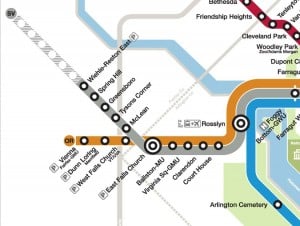 A spokesman for Washington Metropolitan Area Transit Authority (Metro) says that the Silver Line bobbing track issue officials had expressed concern with earlier this week has been determined to be a component issue rather than a systemic one.
A spokesman for Washington Metropolitan Area Transit Authority (Metro) says that the Silver Line bobbing track issue officials had expressed concern with earlier this week has been determined to be a component issue rather than a systemic one.
That means the faulty component will be replaced, and Metro will likely announce the rail extension’s operational readiness date on Monday, said Metro’s Dan Stessel.
“That news alleviates the concern we had with MWAA’s progress towards an operational readiness date,” he said.
Operational readiness means the outstanding issues have been addressed and Phase 1 of the $5.6 billion project is ready to be turned over to Metro. Metro will then have up to 90 days to conduct its own testing and training.
The opening of the Silver Line, which will run from East Falls Church to Tysons Corner to Reston’s Wiehle Avenue, is more than six months behind schedule.
In a call with reporters on Monday, Rob Troup, Metro’s Deputy GM of Operations, said there was an issue with the bobbing track circuit, which connects the Silver and Orange lines east of the East Falls Church Station. When there is an issue, a circuit will read a false sense of occupancy and the approaching train will go into a braking mode, said Troup.
The April 23 agreement between Metro and Metropolitan Washington Airports Authority, which is building the Silver Line, called for adding four blocking capacitors to address the issue. The fixes fared well in testing, but over the weekend one failed, said Troup.
Even with the outstanding issues — Metro had a list of 33 items in 13 categories that MWAA needed to fix — Troup said this week he was “encouraged by the progress and projected ridership “sometime this summer.”
Graphic: Metro file
 A Metro official says the Metropolitan Washington Airports Authority (MWAA) is making progress on pre-operational fixes to the Silver Line, however he still cannot pinpoint an opening date for the first phase of the $5.6 billion rail extension.
A Metro official says the Metropolitan Washington Airports Authority (MWAA) is making progress on pre-operational fixes to the Silver Line, however he still cannot pinpoint an opening date for the first phase of the $5.6 billion rail extension.
“We are tracking to be able to provide service sometime this summer,” Rob Troup, Metro Deputy General Manager of Operations said Monday in a media conference call. “A lot depends on progress MWAA makes in resolving issues. I can’t tell you an operational readiness date, but I am encouraged by the progress.”
Troup said that MWAA is “at the more than the halfway point for the pre-ORD items.”
On April 23, MWAA and Metro agreed to accept the project as “substantially complete,” but to also allow MWAA additional time to complete certain items. Without this agreement, MWAA would have been required to complete all items before Metro takes control, meaning an opening date that would be later in the year.
The project is already nearly eight months behind schedule.
Troup said there are 13 pre-operation readiness (ORD) categories, and those categories have 33 subsets of fixes. Among those deemed fixed are station leaks (including some at Wiehle-Reston East) and a loss of speed readout issue. Faulty wiring in the station speakers is on its way to being fixed, as is an issue with the Horton Remote Terminal Units (RTUs), which help run the crucial Automatic Train Control software, said Troup.
“The RTU issue…is not a vital safety issue,” said Troup. “It is a reliability issue.”
Troup said Metro wants 98 percent RTU reliability. After Metro accepts operational readiness, there will be a complete changeout of the system.
Over the weekend, an issue arose with the bobbing track circuit, said Troup. Bobbing Track Circuits have to do with the junction of the Silver and Orange lines east of the East Falls Church Station. A circuit will go into a false sense of occupancy and the approaching train will go into a braking mode, said Troup.
The April 23 agreement called for adding four blocking capacitors to address the issue. The fixes fared well in testing, but over the weekend one failed, said Troup. He said this is also a reliability issue and not a safety issue, and after operational readiness this will also have a system upgrade.
Additional testing is being performed to see if the failure was a system issue or a component failure. Those test results should be available on Tuesday, Troup said.
Once Metro and MWAA agree on pre-operational readiness, Metro will have 90 days to complete its own testing and training.
Photo: Metro file photo
 The Silver Line received final approval Thursday of nearly $1.9 billion in Transportation Infrastructure Finance and Innovation Act (TIFIA) loans, paving the way for Phase 2 of the rail project to be built with a lower impact to Dulles Toll Road users.
The Silver Line received final approval Thursday of nearly $1.9 billion in Transportation Infrastructure Finance and Innovation Act (TIFIA) loans, paving the way for Phase 2 of the rail project to be built with a lower impact to Dulles Toll Road users.
This will be the largest loan in the TIFIA program’s history, said members of the Virginia congressional delegation.
“Today’s final approval of the TIFIA loan is great news for the future economic growth of Northern Virginia,” Senator Mark Warner (D) said in a statement. “Our bipartisan congressional delegation has been unified in pushing to get this critical piece of financing, which will provide welcome and meaningful relief for commuters using the Dulles Toll Road. This is a huge step forward for a project that has been decades in the making.”
The loan is expected to close in the coming weeks. TIFIA is a program of the U.S. Department of Transportation that provides federal credit assistance to finance major surface transportation projects of national and regional significance.
Construction of Phase 2, which will run from Reston’s Wiehle Avenue to Reston Parkway, Herndon, Dulles International Airport and Loudoun County, should begin later this year.
Phase 1 of the $5.6 billion project will likely open this summer. Construction on Phase 1 has been deemed complete. MWAA and Metro are conducting final testing, but no opening date has been set. Phase 1 is currently running about seven months behind schedule.
While Phase 1 of the rail line received $900 million in federal funding, Phase 2 received none, and many observers predicted a large spike in tolls to make up the difference. Tolls have risen the last three years, but now will remain frozen for five years, MWAA officials said. Phase 2 will also receive $300 million from the Commonwealth of Virginia.
In a statement, MWAA called the loan approval “a victory for users of the Dulles Toll Road, whose toll payments help fund construction of the Silver Line extension of the Washington region’s Metrorail public transit system.”
“The Airports Authority’s objective has always been to keep tolls on the Dulles Toll Road as low as possible, and the TIFIA loan is a major factor in meeting that objective. Thanks to the favorable interest rates the loan provides, as well as $300 million committed by the Commonwealth of Virginia, the Airports Authority will be able to hold tolls at current levels through 2018 and to limit future toll increases.”
Phase 2 is expected to begin operations in 2018.
Photo: MWAA/File photo
 When the Metropolitan Washington Airports Authority and Metro came to an agreement on Silver Line turnover on Thursday, it was hailed from Capitol Hill to Dulles Airport as a major step towards getting the rail extension open this summer.
When the Metropolitan Washington Airports Authority and Metro came to an agreement on Silver Line turnover on Thursday, it was hailed from Capitol Hill to Dulles Airport as a major step towards getting the rail extension open this summer.
But at what cost?
The project is already seven months behind schedule and will be missing a project manager since Pat Nowakowski announced last week he is leaving the job. It is also $150 million over budget.
And those are just the issues before one starts to look at the list featured in the agreement, which includes more than 50 items, some of them major system woes that need to be addressed before passengers can safely ride the line.
The Silver Line’s Phase 1 will run from East Falls Church to Reston’s Wiehle Avenue. Dulles Transit Partners, the contractor building the line, submitted for “substantial completion” on April 9, the same day $25,000-a-day penalties were slated to begin under the terms of the contract with MWAA.
The submission was actually a resubmission as DTP, a division of Bechtel, also filed on Feb. 7 — and MWAA found issues of 7 of 12 areas in its review.
Those issues were supposed to be fixed before MWAA could accept the project to turn over to Metro. MWAA said Thursday it was accepting the project as substantially complete, even if dozens of punchlist items were, in fact, not complete.
Metro said if the agency waited until MWAA completed all the necessary work before taking custody of the project, passenger service probably wouldn’t begin until late 2014 — about a year behind schedule.
But there is still no opening day in site and fixes ranging from “ponding in stations” to automatic train control glitches to “waterproofing at Wiehle Station are not exactly quick cosmetic fixes.
“The deal MWAA struck with WMATA yesterday makes a farce of the concept of ‘substantial completion,’ ” says Terry Maynard, co-chair of Reston Citizens Association’s Reston 2020 Committee. “Instead of verifying and certifying that DTP has built the Silver Line to contract specifications before turning it over to WMATA for testing and training, MWAA is passing off a poorly and incompletely constructed rail line with a 50-item laundry list of work that needs to be done before WMATA may accept it. Some of that work is simple, but some of it will be difficult, expensive, and time consuming to complete.”
Maynard is concerned about what the cost to MWAA — and ultimately the taxpayer — will be to make the fixes. Under the terms of the agreement, MWAA must:
- Reimburse WMATA (Metro) for costs it has incurred in providing technical advisory services as a direct result of the line not being completed on Sept. 9, 2013.
- Cover Metro’s cost of having two employees, 24 hours a day, seven days a week, monitoring the Horton Remote Terminal Units (RTUs), which help run the crucial Automatic Train Control software. As mentioned in a $1.8 million contract MWAA awarded last week to a New York company, the current controls are below par and replacing and upgrading could take a year.
- MWAA will also pay Metro the costs of managing said contract with Alstom Signaling.
“The delays, repairs, and new construction requirements in the MWAA-WMATA deal will all cost money, probably tens of millions of dollars although no one has told the public what the cost will be,” said Maynard. “Worse, we don’t have any idea who will pay for all this. “
Maynard says if the costs are shared under the funding partners agreement among MWAA, Loudoun, and Fairfax counties, it means that Dulles Toll Road users will end up paying about two-thirds of the added cost.
“It makes no sense whatsoever that toll road users should pay for the failure of DTP to meet its contractual obligations or the failure of MWAA to make sure that it did.”
MWAA officials said last week about $23 million is available in its contingency fund.
Metro General Manager Richard Sarles said Thursday that Metro will likely take control of the line next month and that allowing MWAA to complete the items after that will help get the line open this summer.
Sen. Mark Warner (D), who met with MWAA officials this week, says both agencies need to get the project done correctly and quickly.
“I strongly encourage MWAA and WMATA to maintain a sense of urgency so that we will see the Silver Line up and running before the end of summer,” he said in a statement. Warner has been critical of the Silver Line’s delays for months.
“I urge everyone involved to pull together to get the remaining punch-list issues resolved quickly so we can move forward to the crucial safety testing. Too many travelers and taxpayers have waited too long for these final steps not to be resolved as quickly and efficiently as possible.”
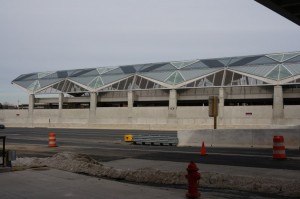 Metro General Manager and CEO Richard Sarles announced an agreement on Thursday with the Metropolitan Washington Airports Authority that will move the Silver Line closer to opening day, possibly this summer.
Metro General Manager and CEO Richard Sarles announced an agreement on Thursday with the Metropolitan Washington Airports Authority that will move the Silver Line closer to opening day, possibly this summer.
Phase 1 of the $5.6 billion Silver Line — which will run from East Falls Church to Reston’s Wiehle Avenue — is more than six months behind schedule.
Under the agreement, Metro will allow MWAA additional time to complete certain items after the project is turned over to Metro, but prior to the start of passenger service, Metro says. Without this agreement, the Airports Authority would have been required to complete all items before Metro takes control, meaning an opening date that would be later in the year.
The Airports Authority is still required to address all priority items — those that affect reliability or require significant track access — prior to handing the project off to Metro. Some examples:
- Resolving items identified during system performance demonstrations, such as loss of speed readouts (a signal problem that affects reliability)
- Installation of capacitors to resolve interlocking “bobbing” track circuits
- Improve the reliability of traction power circuit breakers
- Completion of all work that requires significant track access or single tracking
“While there are still outstanding items for the Airports Authority and their contractor to resolve, today’s agreement allows us to move this project closer to opening day for our customers by allowing certain tasks to be completed after the project is in Metro’s control,” Sarles, Metro General Manager and Chief Executive Officer, said in a statement.
“We expect that the Airports Authority will complete the remaining items in a timely fashion, thereby allowing us to open the line this summer.”
MWAA also announced Wednesday that it has accepted Dulles Transit Partners’ declaration of substantial completion — even though there are still many punchlist items that need to be repaired.
“Achieving substantial completion is a significant milestone,” said Airports Authority President and CEO Jack Potter. “We have conducted a thorough review of the contractor’s submission and are satisfied that Phase 1 has met the contractual requirements that will allow the project to now move to the next steps in the process to begin passenger service.”
After substantial completion, the next major milestone is the “Operational Readiness Date” (ORD), which is when the project is turned over to Metro’s custody and control. If the Airports Authority completes all priority tasks in a timely manner, ORD may be achieved in late May, Sarles said.
Following ORD, Metro has up to 90 days for testing, employee training and emergency drills prior to the start of passenger service, says Metro. With today’s agreement, Metro will permit the Airports Authority to use this time to complete remaining tasks including:
- Providing to Metro safety certification documentation demonstrating that all open items have been closed
- Resolving traction power reliability issues
- Executing a contract for the replacement of track circuit modules
- Resolving leaks and drainage issues
- Grounding of tunnel handrails and replacement of coaxial cable in the tunnel
- Replacing public address speakers to meet Virginia Department of General Services requirements
- Elevator shaft and piston replacement at Tysons Corner station
- All work required to obtain permanent certificates of occupancy
Many of those tasks were found deficient when DTP first filed for substantial completion in February. DTP was supposed to have addressed and fixed those issues in the interim.
Dulles Transit Partners filed for “substantial completion” for Phase 1 on April 9. It was the second time the contractor, a division of Reston-based Bechtel, filed. DTP said its work was finished on Feb. 7, but MWAA’s review showed issues in many areas, including ongoing issue with the Automatic Train Control software.
Last week, MWAA awarded a $1.8 million contract to a New York company to upgrade the ATC controls. That could take a year, MWAA said.
 The Metropolitan Washington Airports Authority will rule the Silver Line is “substantially complete” today, sources say. But the handoff to Metro still will not happen for a while so there is still no projected opening date.
The Metropolitan Washington Airports Authority will rule the Silver Line is “substantially complete” today, sources say. But the handoff to Metro still will not happen for a while so there is still no projected opening date.
WAMU reports that MWAA, which completed its own inspection of the project, will sign off on the project but the handoff will not come for about a month.
WMATA (Metro) will then have 90 days to conduct its own testing before Phase 1 of the Silver Line, which will run from East Falls Church to Reston’s Wiehle Avenue, would be open to the public.
Construction contractor Dulles Transit Partners filed for “substantial completion” for Phase 1 on April 9. It was the second time the contractor, a division of Reston-based Bechtel, filed. DTP said its work was finished on Feb. 7, but MWAA’s review showed issues in many areas, including ongoing issue with the Automatic Train Control software.
“We have been looking at the test results from the train control system,” MWAA CEO Jack Potter said on Tuesday.
Last week, MWAA voted to award a $1.8 million contract to Alstom Signaling, the company that built the ATC system, for an upgrade. The system upgrade could take a year, but MWAA officials have said they hope to get the Silver Line operational without it. Extra personnel would be in place in the meantime.
Phase 1 of the $5.6 billion Silver Line is more than six months behind schedule, which is why Virginia Gov. Terry McAuliffe met with MWAA officials on Tuesday.
“We’re about seven months delayed,” McAuliffe told reporters. “I understand [that] things happen on a project of this scale, this magnitude. But I wanted to know why. I want to know how we’re spending our money. I want to know what’s going on.”
After the one-hour meeting with McAuliffe said he was satisfied with the answers he received.
File photo/MWAA
 Upgrading the faulty tracking control software for Metro’s Silver Line will cost $1.8 million and may take up to a year to replace, but can the train finally leave the station without it?
Upgrading the faulty tracking control software for Metro’s Silver Line will cost $1.8 million and may take up to a year to replace, but can the train finally leave the station without it?
It remains to be seen whether Metro and Metropolitan Washington Airport Authority would delay the opening of the Silver Line — which is already months behind schedule — for that length of time. But on the other hand, the ATC system is crucial for a safe rail line. ATC failures were deemed responsible in the June 2009 Metro crash that killed the driver and eight passengers.
Officials said last week that the Silver Line may get up and running with the ATC that is in place now, but may have human operators working to ensure safety. In its approval of the contract to Alstom Signaling to provide the technology upgrade, MWAA said “WMATA (Metro) will provide “extra staffing at the Project’s expense to ensure reliability.”
MWAA officials have until next week to complete their review of Betchtel’s submission of “substantial completion” of the Silver Line’s 11-mile Phase 1. The $2.8 billion Phase 1 will run from East Falls Church to Reston’s Wiehle Avenue.
Betchel’s Dulles Transit Partners, which built the project, originally submitted for substantial completion on Feb. 7, but MWAA said there were issues in 7 of 12 areas, including the ATC system. The ATC glitches were also responsible for one of several completion delays last fall. The project was originally (but unofficially) estimated to have its first riders by December 2013; the safe estimate now is by summer.
MWAA said Alstom is the only contractor able to provide the necessary equipment for the upgrades and that the upgrades will be paid from a $23 million Silver Line contingency fund. Citizens advocacy group Reston 2020 said that estimate is oversimplified.
“Of any extra costs MWAA agrees to pay WMATA for staffing, MWAA will actually pay only 4 percent of while Dulles Toll Road users will pay half under the inequitable ‘Funding Partners’ agreement.” Reston 2020 co-chair Terry Maynard writes on the group’s blog. “The rest will be paid by Fairfax and Loudoun counties.”
Meanwhile, Virginia Gov. Terry McAuliffe met with MWAA officials about the Silver Line on Tuesday, WTOP reports.
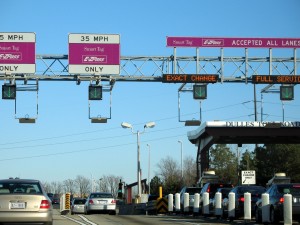 The Metropolitan Washington Airports Authority said on Wednesday that it intends Dulles Toll Road tolls to remain steady through 2018.
The Metropolitan Washington Airports Authority said on Wednesday that it intends Dulles Toll Road tolls to remain steady through 2018.
MWAA CEO Jack Potter said the toll halt will be possible in part from a nearly $2 billion government loan the organization is slated to receive. MWAA applied for a $1.9 billion Transportation Infrastructure Finance and Innovation Act (TIFIA) loan in February.
The (TIFIA) program provides federal credit assistance to finance major surface transportation projects of national and regional significance, says MWAA.
While the loan still requires final federal approval, it would benefit drivers on the toll road. By supplying financing at more favorable interest rates than through private capital markets, less money would need to be generated by tolls to cover long-term financing costs for the project.
MWAA is also counting on a previous commitment of $300 million by the Commonwealth of Virginia to offset toll increases, said Potter.
Tolls on the Dulles Toll Road have increased every year for the last five years. Some toll road-watchers such as Reston 2020 have estimated the one-way tolls would rise as high as $20 eventually if officials did not find alternate sources of funding Metro’s Silver Line Phase 2.
Potter said at MWAA’s monthly meeting: “We have already realized significant savings from debt refinancing, a lower-than-expected winning bid for the major design-build contract for Phase 2 of the project and the important contribution of $300 million from the Commonwealth of Virginia during the 2013 legislative session. Securing the TIFIA loan is the final piece of the puzzle to let us freeze toll rates for the next five years.”
At its meeting the board also authorized the issuance of $450 million Dulles Toll Road Revenue Refunding Bonds.
The $2.8 billion Phase 1 — which will run from East Falls Church to Reston’s Wiehle Avenue — received $900 million in federal money. Phase 2, from Wiehle to two additional stops in Reston/Herndon then into Loudoun County and Dulles International Airport, received none. Construction of Phase 2 is expected to begin soon with an estimated opening in 2018.
File photo courtesy of MWAA
 Metro’s Silver Line has not yet opened, but the Washington Metropolitan Airports Authority (MWAA) is already seeking a $1.8 million technology upgrade of the Automatic Train Control system.
Metro’s Silver Line has not yet opened, but the Washington Metropolitan Airports Authority (MWAA) is already seeking a $1.8 million technology upgrade of the Automatic Train Control system.
MWAA is building the Silver Line rail extension. The 11-mile, $2.8 billion Phase 1 of the Silver Line will run from East Falls Church to Reston’s Wiehle Avenue. When it is satisfactorily completed — a decision that could come in the next two weeks — the project will be turned over to Metro, which will then conduct its own testing before setting an opening date.
The Dulles Corridor Committee of the MWAA Board of Directors on Wednesday approved awarding a sole source contract to Alstom Signaling, Inc., of Henrietta, N.Y. for an Automatic Train Control (ATC) technology upgrade.
Alstom previously installed the Horton Remote Terminal Units (RTUs) as part of the design of the Automatic Train Control System. That system is used throughout the existing Metro system, MWAA says.
But in testing the system for the Silver Line, the RTUs have proven faulty.
“The Horton RTUs have proven unreliable in the Phase 1 application,” MWAA documents read. “Increased reliability can be achieved by incorporating the use of integral circuit boards in the Alstom Vital Processor Interlock (VPI) instead of using RTU equipment.”
“This is a reliability issue, not a safety issue,” the documents read. “The technology upgrade will take one year to complete.”
MWAA says that it will advise Dulles Transit Partners, the Bechtel unit that constructed the rail line, to make adjustments to improve reliability. It also says that once service begins, WMATA (Metro) will provide “extra staffing at the Project’s expense to ensure reliability” and that Alstom is the only contractor able to provide the necessary equipment for the upgrades.
MWAA officials said early Wednesday that roughly $23 million is available in the Silver Line contingency fund.
The ATC system has been a bug in constructing the Silver Line — and it is crucial to get it right. In 2009, the system failed to detect the presence of a train on the tracks leading to a Red Line crash that killed nine people and injured dozens of others.
In June, Federal Transit Administrator Peter Rogoff said he was troubled by unauthorized design changes Alstom made without consulting Metro. In addition, because of a shortage of equipment, Alstom workers allegedly moved some control boards from one monitoring station to another, which meant they were checking the same set of boards rather than new ones, according to The Washington Post.
In November, more issues with the ATC system were found, leading to a delay of several months.
While an official opening date was never announced, Phase 1 was originally estimated to be ready to hand off to Metro last summer for a December 2013 opening. Last spring, that was moved to a November turnover. In November, the project was delayed further while problems with the Automatic Train Control System were addressed.
On Feb. 7, DTP announced it had reached “substantial completion,” meaning it felt the construction was finished. MWAA completed a two-week review and found a host of problems, including some with the ATC system.
DTP says it fixed the problems, and on April 9 — the same day $25,000 a day penalties would kick in as part of the construction contract — submitted the project again. MWAA is in the midst of another 15-day review.
Once MWAA signs off on the DTP’s work it will turn the Silver Line over to Metro, which then has 90 days to complete its own testing.
As expected, the contractor building Metro’s Silver Line submitted the project for approval on Wednesday, avoiding a deadline in which fines of $25,000 a day were about to begin, Metropolitan Washington Airports Authority officials confirmed.
Dulles Transit Partners, part of Reston-based Bechtel Corporation, said it has reached “substantial completion” on the $2.7 billion Phase 1 of the project, which will bring rail from East Falls Church to Reston’s Wiehle Avenue.
“We are very pleased with the progress and moving the Silver Line one step closer to full operation,” Bechtel officials said in a statement on Tuesday.
Dulles Transit Partners originally said on Feb. 7 that it had reached the substantial completion mark. Substantial completion is the point at which they feel their job is done and ready to be turned over to Metro. Metro would then have a 90-day period to conduct its own testing.
However, part of the handoff involves Metropolitan Washington Airports Authority (MWAA) conducting its own two-week review, and in late February MWAA found issues in 7 of 12 areas, ranging from leaks to problems with the automatic train control system. It was revealed at a recent MWAA Board meeting that speakers in all five stations have to be reinstalled, and there is a cable issue in the Tysons tunnel.
DTP says those issues have been fixed. MWAA will now conduct another two-week review process. If the project is deemed ready to go, the rail could open in June or July.
“We are that much closer to leaving the train station,” Rep. Gerry Connolly said at an appearance in Reston. “It will be operational, we hope, by July.”
According to DTP’s contract, if the work is not finished starting April 10, DTP faces a $25,000-a-day penalty until the work is done. If the project is not completed 92 days after that April date, the contractor would have to pay roughly $2.3 million in fines, plus an additional $75,000 a day.
Ultimately, if the project is delayed more than six months from that April date, DTP could be required to pay more than $9 million total. Under the terms of the contract, the payments are capped at $60 million.
Former Congressman Tom Davis, a MWAA board member said recently that the most important thing is that the rail line is 100-percent safe and ready to go before opening.
“Hopefully, we can meet the April 9 deadline and it will be acceptable and we could move on,” Davis said. “But we want the public to know that when this transit system opens, it is going to be Grade A reader for business. It is going to be safe and it is going to work efficiently.”
While a opening date for the Silver Line was never set, officials had hoped to finish testing last September for a possible December opening. But delays were announced last summer, then in November when the tracking system issues were discovered.
After the March setback, officials are no longer estimated when the turnover may be as DTP works to correct the problems. However, a source told WTOP last week that the Silver Line may open by July 4.
This story will be updated with further reaction from MWAA.
Photo courtesy of MWAA
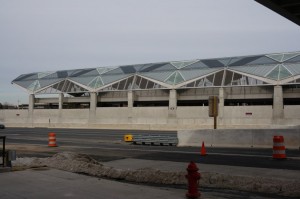 The contractor building Metro’s Silver Line has until the middle of next week to fix the construction problems or start paying big fines.
The contractor building Metro’s Silver Line has until the middle of next week to fix the construction problems or start paying big fines.
Judging by the number of issues found in last month’s inspection by Metropolitan Washington Airport Authority, Dulles Transit Partners (DTP) will likely have to start paying the $25,000 a day.
DTP told MWAA in February it had reached “substantial completion” on construction of the $2.8 billion rail extension from East Falls Church to Reston’s Wiehle Avenue. In contracting-speak, that meant the project was ready to be turned over to Metro, which would conduct its own testing before opening the line.
But MWAA completed a 15-day review and found issues in 7 of 12 areas, ranging from leaks to problems with the automatic train control system. It was revealed at a MWAA Board meeting two weeks ago that speakers in all five stations have to be reinstalled, and there is a cable issue in the Tysons tunnel.
According to DTP’s contract, the work is not finished starting April 10, DTP faces a $25,000-a-day penalty until the work is done. If the project is not completed 92 days after that April date, the contractor would have to pay roughly $2.3 million in fines, plus an additional $75,000 a day.
Ultimately, if the project is delayed more than six months from that April date, DTP could be required to pay more than $9 million total. Under the terms of the contract, the payments are capped at $60 million.
“Our goal is to have this wrapped up by April 9, before fines set in,” MWAA President and CEO Jack Potter said March 19.
Former Congressman Tom Davis, a MWAA board member, told WUSA9-TV that the most important thing is that the rail line is 100 percent safe and ready to go before opening.
“Hopefully, we can meet the April 9 deadline and it will be acceptable and we could move on,” Davis said. “But we want the public to know that when this transit system opens, it is going to be Grade A reader for business. It is going to be safe and it is going to work efficiently.”
But Davis also said if DTP has to pay fines, it could benefit the transportation system.
“If it is not ready, I think the airports authority can make some money on it,” Davis told WUSA. “
Citizens advocacy group Reston 2020 says the fines should go to offset rising Dulles Toll Road rates, which may have to climb high to pay for Silver Line Phase 2, which is not fully funded.
“I believe that every last cent of those fines should go to stabilizing DTR tolls,” Maynard recently wrote in a letter to Rep. Gerry Connolly (D- VA 11th). “Although the projected sums of the fines are not large compared with the multi-billion dollar price tag of Phase 1 of the line’s construction, we are at the point where every dollar counts.”
While a opening date for the Silver Line was never set, officials had hoped to finish testing last September for a possible December opening. But delays were announced last summer, then in November when the tracking system issues were discovered.
After the March setback, officials are no longer estimated when the turnover may be as DTP works to correct the problems.
When MWAA certifies that the issues are repaired, the project will be turned over to Metro, which has 90 days to complete its own testing.
 One Metropolitan Washington Airports Authority board member called the Silver Line saga a “soap opera.” Another suggested the board start working with lawyers.
One Metropolitan Washington Airports Authority board member called the Silver Line saga a “soap opera.” Another suggested the board start working with lawyers.
That was yesterday. Today, all parties are looking at many more weeks/months of delays before Metro’s Silver Line opens.
At the MWAA board meeting on Wednesday, Dulles Transit Partners, the contractor that constructed the $2.7-billion Phase 1 of the rail extension that will run from East Falls Church to Reston’s Wiehle Avenue, said it could not predict when ongoing problems with the Silver Line would be fixed.
Therefore, it is impossible to predict an opening date. While no official opening has ever been set, there once was a time, more than a year ago, where the first passengers were estimated to ride the line by December of 2013.
DTP, a division of Bechtel, told MWAA in early February that it had reached “substantial completion.” But in their own review, MWAA found many problems. Among them — faulty connections in the loudspeakers at all five stations and ongoing issues with the Automatic Train Control System.
If the work is not satisfactorily turned over to MWAA by April 9, DTP could face millions of dollars in fines.
“Our goal is to have this wrapped up by April 9, before fines set in,” MWAA President and CEO Jack Potter said Wednesday.
While no completion date was ever given by MWAA, preliminary estimates were that the line would be completed by August or September 2013 and the first passengers would ride by the end of 2013. That later was pushed into early 2014. In January, the original problem with the ATC was discovered, delaying completion until at least spring. With this latest setback, could it be fall of 2014 — or even early 2015 — before the Silver Line sees riders?
Reston Now readers responded to a poll in Februrary. Of 506 votes, 27 percent said they predicted the line would open in August or September 2014; 26 percent said June/July 2014; 18 percent said 2o15.
Given the latest issues, what is your prediction now?
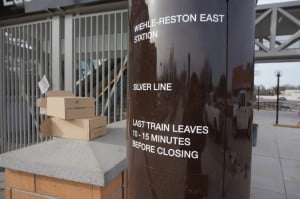 If the contractor building Metro’s Silver Line does not fix ongoing problems and satisfactorily turn the project over to Metropolitan Washington Airports Authority by April 9, it will face fines of $25,000 a day.
If the contractor building Metro’s Silver Line does not fix ongoing problems and satisfactorily turn the project over to Metropolitan Washington Airports Authority by April 9, it will face fines of $25,000 a day.
After a tense MWAA board meeting on Wednesday, it looks as though contractor Dulles Transit Partners may be hard pressed to make that deadline.
It was revealed Wednesday that there are still significant problems with the 11-mile rail extension, which will run from East Falls Church to Reston’s Wiehle Avenue. Problems range from speakers in the stations that are not up to fire code to continuing issues with the Automatic Train Control System.
DTP told MWAA on Feb. 7 that it had reached “substantial completion” on the $2.8 billion project. However, after a 15-day review period, MWAA found issues in 7 of 12 areas, including performance issues with the ATC system, water leaks in buildings, and elevator and escalator problems.
If the work is not finished starting April 10, DTP would face a $25,000-a-day penalty until the work is done. If the project is not completed 92 days after that April date, the contractor would have to pay roughly $2.3 million in fines, plus an additional $75,000 a day.
Ultimately, if the project is delayed more than six months from that April date, DTP could be required to pay more than $9 million total. Under the terms of the contract, the payments are capped at $60 million.
“Our goal is to have this wrapped up by April 9, before fines set in,” MWAA President and CEO Jack Potter said Wednesday.
Pat Nowakowski, executive director for the Dulles Corridor Rail Association, said there is no estimated opening date for the Silver Line and there is no projected date for when DTP will be done fixing the issues. He said “when the contractor submits paperwork this time around, they are working to be certain the project is complete.”
WTOP reports that the entire speaker system and the ATC system may have to be replaced, which could delay the project even further. WTOP also says that the MWAA Board is assembling a legal team in case the contractor misses another deadline. MWAA officials said the cost of the corrections will be covered by a contingency fund.
While no completion date was ever given by MWAA, original estimates were that the line would be completed by August or September 2013 and the first passengers would ride by the end of 2013. That later was pushed into early 2014. In January, the original problem with the ATC was discovered, delaying completion until at least spring.


